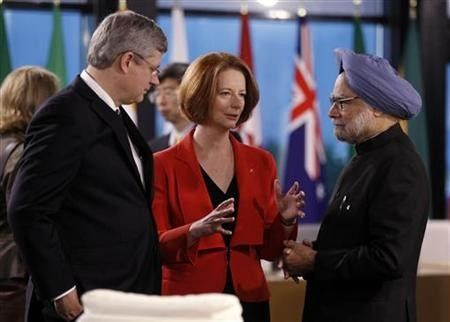Australia's Labor Party Endorses Uranium Sales to India

Australia's ruling Labor Party Sunday endorsed plans to open up uranium sales to India, clearing the way for talks on a bilateral nuclear agreement and resolving an issue that has caused diplomatic tensions between the two nations.
Prime Minister Julia Gillard announced the plan in November, but needed her party's national policy conference to overturn its ban on selling uranium to countries which are not signatories to the nuclear Non-Proliferation Treaty.
Gillard successfully pushed her uranium policy through the conference, despite an often heated debate and chants from protesters who remain opposed to nuclear energy and weapons.
We should take a decision that is in our nation's interest, a decision about strengthening our strategic partnership with India in this the Asian century, Gillard said, adding Australia already sold uranium to China, the United States and Japan.
Australia has almost 40 percent of the world's known uranium reserves, but supplies only 19 percent of the world market. It has no nuclear power stations.
India, Asia's third-largest economy and the world's largest democracy, has long complained about the Australian ban and wants more access to uranium to meet an ambitious target for nuclear energy, with plans to build 30 nuclear power stations in the next 20 years.
The move to allow sales to India follows a landmark U.S. agreement to support the civil nuclear programme in India, signed in 2008.
Australia's uranium industry welcomed the policy shift, which it said could lead to more Indian investment in Australian mining projects.
Chinese, Japanese and Russian companies are seeking out these opportunities and we would expect Indian companies will do the same, Australian Uranium Association chief executive Michael Angwin said.
He said India would potentially buy up to 2,500 tonnes of Australian uranium a year by 2030, although the first sales could still be some years away as it could take several years to negotiate a nuclear safeguards agreement.
Before selling uranium, Australia negotiates nuclear safeguards agreements with customer nations to ensure nuclear material can only be used for energy and not for nuclear weapons.
Australia now has four mines, BHP Billiton's (BHP.AX) (BLT.L) Olympic Dam, potentially the world's biggest; Energy Resources Australia's (ERA.AX) Ranger mine; the Beverly mine, owned by U.S. company General Atomics, and Honeymoon mines, owned by Uranium One (UUU.TO) and Mitsui & Co (8031.T).
Canberra has forecast uranium exports to rise from around 10,000 tonnes a year to 14,000 tonnes in 2014, worth around A$1.7 billion.
Sunday's party vote was a victory for Gillard, but exposed deep divisions within the government over nuclear energy, with Transport Minister Anthony Albanese leading opposition to any sales to India or expansion of exports.
Albanese said since Japan's Fukushima nuclear disaster in March, most nations, including Germany, Switzerland and Italy, were winding back their commitment to nuclear energy.
Under these circumstances, it is absurd that we should be expanding ours, Albanese told the conference.
Former anti-nuclear campaigner and rock singer Peter Garrett, whose band Midnight Oil railed against nuclear energy, said Labor needed to honour its support for the Non-Proliferation Treaty.
Labor has a great disarmament tradition, Garrett, who is now Australia's Schools Education Minister, told the conference. Where is our vision here? Where is our commitment to a nuclear free future? he added.
© Copyright Thomson Reuters {{Year}}. All rights reserved.





















